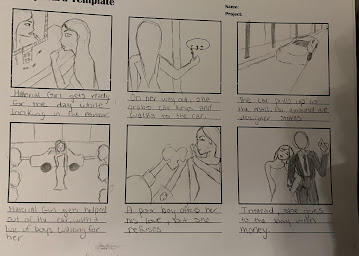Critical Creative Reflection
1.
How does your product use or challenge conventions AND how does
it represent social groups or issues?
My music video for the song Material
Girl by Madonna uses a lot of the conventions that can be found in pop song
music videos. For instance, a common convention of pop videos is a bright and
colorful background. My video utilizes this with the sunny background of
sawgrass mall, and the pop of colors in the actresses’ dresses. The surrounding
stores that I filmed in also had a wide range of colors and bright fluorescent lights
that brightened up the video. Another popular convention for this genre is references
to wealth and fame. My music video followed this convention, mainly with props.
I ordered prop money that was utilized by the actors throughout the video. Other
props such as shiny jewelry and sunglasses also played a part in my music video’s
use of pop culture.
When it came to challenging the
conventions, I mainly did this with the ending of my music video. Throughout
the video, the actress uses the rich boys for money. Typically, it would be
expected for a girl to end up with the guy who has money in a pop video.
However, in my video, I challenged this idea by having the poor boy be the one who
ends up with the rich girl. The concept of choosing love at the end instead of
money goes against the modern-day pop culture conventions that push wealth as
the most important goal of life.
My video addresses the social issues of both classism and misogyny. It mainly demonstrates a divide in classes and how socioeconomic differences can often lead to the dismissal and mistreatment of more impecunious individuals. In the video, the poor boy is denied at first for his lack of wealth, directly demonstrating this. My video also touched on misogyny and how women are often portrayed as gold diggers. Women are often labeled as money hungry in the media, despite the fact that men often seek out money just as much.
2. How does your product engage with audiences AND how would it be distributed as a real media text?
My video engages with a broad audience, as pop music typically
is listened to by a wide variety of people. Nonetheless, it mainly reaches a
younger demographic of teenagers to young adults. Part of this is because the
actors used are all teenagers themselves. This makes it more likely to be relatable
to a younger audience and therefore capture their attention. Another appeal is
the setting I filmed the video at. Sawgrass Mall is a popular hangout spot for
young adults and high schoolers, so the use of such a lively and well-known area
can attract viewers of that age.
As a real media text, my video would most likely be distributed on
YouTube. This is usually where artists upload music videos for their songs. YouTube
is one of the most popular social media apps for viewing longer content, so distributing
it there would be the most effective. Another place where my video might be
distributed is Apple Music. They have recently added a section for artists to upload
music videos to their profiles. Since Apple Music is the most popular music
service in the U.S., I believe distributing it through there would also be a
likely choice.
3. How did your production skills develop throughout this project?
From my first project to this current one, I have made a lot of
improvements in filming. Since this video was going to be a minute and fifteen
seconds long, I knew I had to get more dynamic shots and angles to make it more
interesting. During the filming process, I learned how to utilize camera
movements more effectively like a tilt and pan. They have become more stable
and less shaky compared to when I first did one for this class. I also used
more tracking shots in this project, which helped me really develop how to follow
the subject. However, one of my biggest improvements was with using more varied
angles and shots. Instead of keeping everything at eye level and as a medium
long shot, I used a wide combination of high angles, over-the-shoulder shots, close-ups,
extreme close-ups, and long shots to add variety. Another noticeable development
was an improvement in video quality. For this project, I filmed on a newer
device and used my phone’s cinematic mode. This allowed me to get higher
quality and more professional-looking shots compared to my first project.
4. How did you integrate technologies – software, hardware and online – in this project?
Throughout this project, I utilized
multiple technologies. The main, and most unfamiliar, one that I used was an
editing software named CapCut. I saw many people on TikTok use it to edit
videos, so I decided to give it a try. I used the program to edit the audio and
the video.
After downloading an MP3 of the song I was
using for my music video, I uploaded it into the software. From there I was
able to use their cut feature to reduce the audio file down to about a minute
and fifteen seconds. Once it was cut down, I needed to find a way to make it
smoother, so I tested their fade-out feature to easily transition the audio to the
end. When it came to the video, I used an editing effect known as an overlay to
get a split screen. I also used the transitions that the app had to make to
clips nicely flow together.
The other technology I used was my phone.
I did all the filming on my phone using its built-in camera app. The cinematic
feature I used allowed me to get high-quality shots for the video. My phone played
a big role in communication as well. When I needed to get in contact with my group
members or send them any clips, I used my phone’s messaging app to reach them. Overall
technology played a huge role in the process of making this video.



Comments
Post a Comment